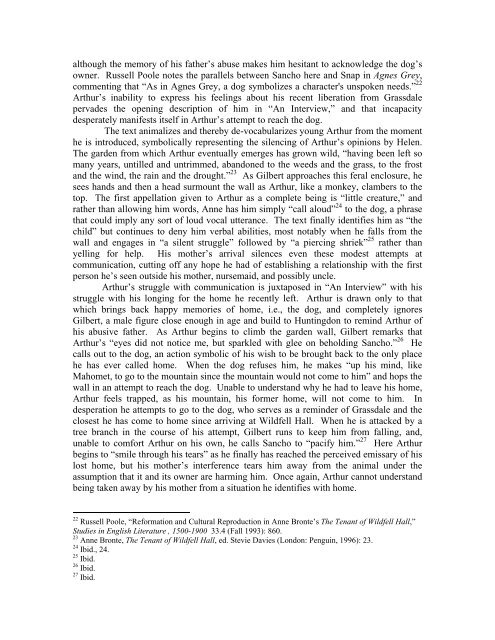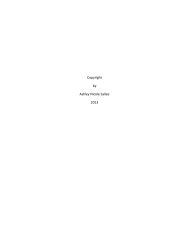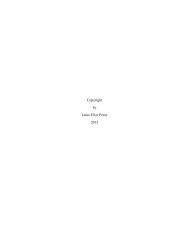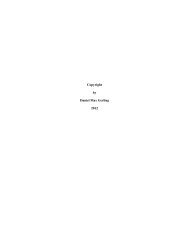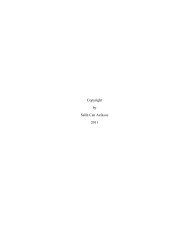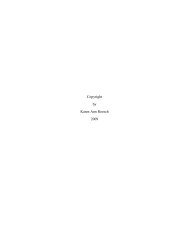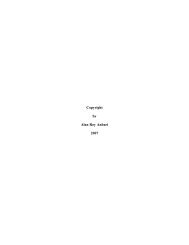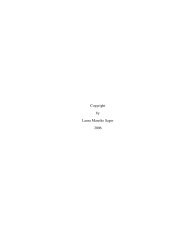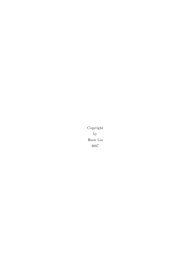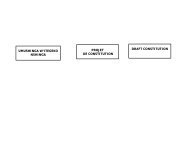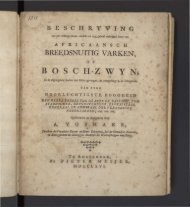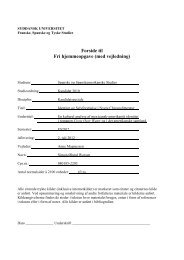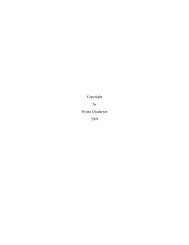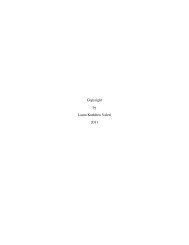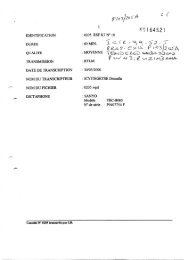The Secret Society: Descendants of Crypto-Jews in the San Antonio ...
The Secret Society: Descendants of Crypto-Jews in the San Antonio ...
The Secret Society: Descendants of Crypto-Jews in the San Antonio ...
Create successful ePaper yourself
Turn your PDF publications into a flip-book with our unique Google optimized e-Paper software.
although <strong>the</strong> memory <strong>of</strong> his fa<strong>the</strong>r’s abuse makes him hesitant to acknowledge <strong>the</strong> dog’s<br />
owner. Russell Poole notes <strong>the</strong> parallels between <strong>San</strong>cho here and Snap <strong>in</strong> Agnes Grey,<br />
comment<strong>in</strong>g that “As <strong>in</strong> Agnes Grey, a dog symbolizes a character's unspoken needs.” 22<br />
Arthur’s <strong>in</strong>ability to express his feel<strong>in</strong>gs about his recent liberation from Grassdale<br />
pervades <strong>the</strong> open<strong>in</strong>g description <strong>of</strong> him <strong>in</strong> “An Interview,” and that <strong>in</strong>capacity<br />
desperately manifests itself <strong>in</strong> Arthur’s attempt to reach <strong>the</strong> dog.<br />
<strong>The</strong> text animalizes and <strong>the</strong>reby de-vocabularizes young Arthur from <strong>the</strong> moment<br />
he is <strong>in</strong>troduced, symbolically represent<strong>in</strong>g <strong>the</strong> silenc<strong>in</strong>g <strong>of</strong> Arthur’s op<strong>in</strong>ions by Helen.<br />
<strong>The</strong> garden from which Arthur eventually emerges has grown wild, “hav<strong>in</strong>g been left so<br />
many years, untilled and untrimmed, abandoned to <strong>the</strong> weeds and <strong>the</strong> grass, to <strong>the</strong> frost<br />
and <strong>the</strong> w<strong>in</strong>d, <strong>the</strong> ra<strong>in</strong> and <strong>the</strong> drought.” 23 As Gilbert approaches this feral enclosure, he<br />
sees hands and <strong>the</strong>n a head surmount <strong>the</strong> wall as Arthur, like a monkey, clambers to <strong>the</strong><br />
top. <strong>The</strong> first appellation given to Arthur as a complete be<strong>in</strong>g is “little creature,” and<br />
ra<strong>the</strong>r than allow<strong>in</strong>g him words, Anne has him simply “call aloud” 24 to <strong>the</strong> dog, a phrase<br />
that could imply any sort <strong>of</strong> loud vocal utterance. <strong>The</strong> text f<strong>in</strong>ally identifies him as “<strong>the</strong><br />
child” but cont<strong>in</strong>ues to deny him verbal abilities, most notably when he falls from <strong>the</strong><br />
wall and engages <strong>in</strong> “a silent struggle” followed by “a pierc<strong>in</strong>g shriek” 25 ra<strong>the</strong>r than<br />
yell<strong>in</strong>g for help. His mo<strong>the</strong>r’s arrival silences even <strong>the</strong>se modest attempts at<br />
communication, cutt<strong>in</strong>g <strong>of</strong>f any hope he had <strong>of</strong> establish<strong>in</strong>g a relationship with <strong>the</strong> first<br />
person he’s seen outside his mo<strong>the</strong>r, nursemaid, and possibly uncle.<br />
Arthur’s struggle with communication is juxtaposed <strong>in</strong> “An Interview” with his<br />
struggle with his long<strong>in</strong>g for <strong>the</strong> home he recently left. Arthur is drawn only to that<br />
which br<strong>in</strong>gs back happy memories <strong>of</strong> home, i.e., <strong>the</strong> dog, and completely ignores<br />
Gilbert, a male figure close enough <strong>in</strong> age and build to Hunt<strong>in</strong>gdon to rem<strong>in</strong>d Arthur <strong>of</strong><br />
his abusive fa<strong>the</strong>r. As Arthur beg<strong>in</strong>s to climb <strong>the</strong> garden wall, Gilbert remarks that<br />
Arthur’s “eyes did not notice me, but sparkled with glee on behold<strong>in</strong>g <strong>San</strong>cho.” 26 He<br />
calls out to <strong>the</strong> dog, an action symbolic <strong>of</strong> his wish to be brought back to <strong>the</strong> only place<br />
he has ever called home. When <strong>the</strong> dog refuses him, he makes “up his m<strong>in</strong>d, like<br />
Mahomet, to go to <strong>the</strong> mounta<strong>in</strong> s<strong>in</strong>ce <strong>the</strong> mounta<strong>in</strong> would not come to him” and hops <strong>the</strong><br />
wall <strong>in</strong> an attempt to reach <strong>the</strong> dog. Unable to understand why he had to leave his home,<br />
Arthur feels trapped, as his mounta<strong>in</strong>, his former home, will not come to him. In<br />
desperation he attempts to go to <strong>the</strong> dog, who serves as a rem<strong>in</strong>der <strong>of</strong> Grassdale and <strong>the</strong><br />
closest he has come to home s<strong>in</strong>ce arriv<strong>in</strong>g at Wildfell Hall. When he is attacked by a<br />
tree branch <strong>in</strong> <strong>the</strong> course <strong>of</strong> his attempt, Gilbert runs to keep him from fall<strong>in</strong>g, and,<br />
unable to comfort Arthur on his own, he calls <strong>San</strong>cho to “pacify him.” 27 Here Arthur<br />
beg<strong>in</strong>s to “smile through his tears” as he f<strong>in</strong>ally has reached <strong>the</strong> perceived emissary <strong>of</strong> his<br />
lost home, but his mo<strong>the</strong>r’s <strong>in</strong>terference tears him away from <strong>the</strong> animal under <strong>the</strong><br />
assumption that it and its owner are harm<strong>in</strong>g him. Once aga<strong>in</strong>, Arthur cannot understand<br />
be<strong>in</strong>g taken away by his mo<strong>the</strong>r from a situation he identifies with home.<br />
22 Russell Poole, “Reformation and Cultural Reproduction <strong>in</strong> Anne Bronte’s <strong>The</strong> Tenant <strong>of</strong> Wildfell Hall,”<br />
Studies <strong>in</strong> English Literature , 1500-1900 33.4 (Fall 1993): 860.<br />
23 Anne Bronte, <strong>The</strong> Tenant <strong>of</strong> Wildfell Hall, ed. Stevie Davies (London: Pengu<strong>in</strong>, 1996): 23.<br />
24 Ibid., 24.<br />
25 Ibid.<br />
26 Ibid.<br />
27 Ibid.


